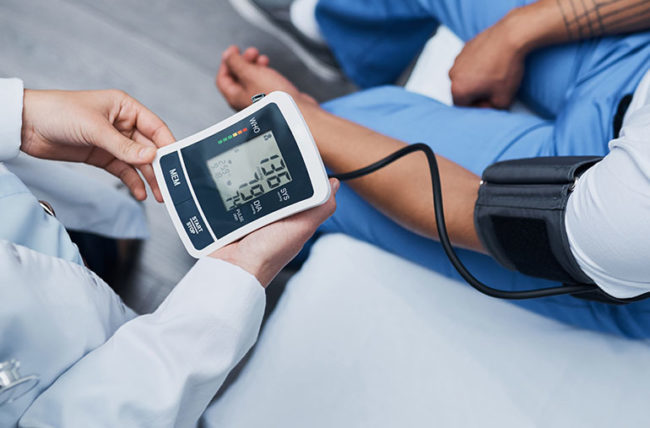Hardly a week goes by without opening a newspaper or magazine to see headlines about newly discovered causes of hypertension, the latest high blood pressure treatments, or the extent to which lifestyle can affect blood pressure. Sometimes, when they are under pressure, you may hear people jokingly claim that their blood pressure is sky-high. However, high blood pressure is no laughing matter and ultimately can contribute to factors that can shorten life, with the World Health Organization estimating that raised blood pressure results in 7.5 million deaths globally each year.
What is high blood pressure?
The human heart is a pump which circulates blood around the body through a network of blood vessels. This takes a certain amount of force, and as with any liquid forced through a tube, blood pumped by the heart meets resistance. The force and the resistance it meets provide us with two important measurements that enable us to determine a blood pressure reading. They are:
Systolic Pressure, the amount of force exerted by the heart to pump blood; and
Diastolic Pressure, the resistance created in the circulatory system.
Although everyone’s blood pressure is different, a safe reading for people under 80 years old is considered to be a systolic pressure of at least 90mmHg and a diastolic pressure of at least 60mmHg, expressed as 90/60mmHg. Medical professionals will measure your blood pressure using a sphygmomanometer which comprises an inflatable cuff and a measurement gauge. There are also digital options available for home use on sale at reputable pharmacies.
The importance of regular checks
High blood pressure or hypertension has no obvious symptoms. According to Public Health England, about 25% of the British population have hypertension, so it is a good idea to get your blood pressure checked at least once every five years.
Why is high blood pressure harmful?
Hypertension places unnecessary strain on the circulatory system and consequently, the organs of the body. This increases the risk of developing serious cardiac problems and strokes. Even vascular dementia has been found to have an association with high blood pressure in later life. Keeping your blood pressure in check and at recommended levels plays an important part in mitigating the risks.
High blood pressure treatment
If your blood pressure is higher than it should be, there several ways of bringing it under control. Pharmaceuticals are one way, and your doctor can advise you on the available hypertension medications. However, depending on the severity of the problem, it may be possible for you to avoid taking drugs by instead make lifestyle changes, such as:
Maintaining your weight within the recommended range;
Keeping alcohol consumption under control;
Taking regular exercise;
Not smoking.
What we eat
Taking a close look at the food we put in our mouths and avoiding those things that contribute to high blood pressure or weight gain. These include:
Reducing salt intake
The kidneys regulate and stabilize fluid levels to ensure the body can continue to function efficiently. Salt is composed primarily of sodium which impacts the kidney’s ability to rid the body of unnecessary levels of fluid, which contributes to hypertension.
Frozen Pizza
Look at some of the toppings on frozen pizza, including cheese, processed meat, and tomato sauce. All these things are high in sodium and in addition, many manufacturers add salt to bases to improve the overall taste of their product.
Chicken skin
Chicken is generally thought to be a healthy dietary option and it is. However, although you might find roast chicken skin in delicious, it should be avoided when high blood pressure is under consideration. This is because chicken skin is high in trans fats which have been shown to increase the amount of bad cholesterol in the blood – a cause of cardiovascular disease.
Canned/bottled tomato products
Most commercially available canned and bottled sauces, including tomato products, contain high levels of both salt and sugar. Both of these things can cause problems for people with hypertension. Fortunately, low sodium alternatives are available.
Low sugar intake
No one can be unaware of concerns about the amount of sugar in the everyday foods we eat, with many consumer campaigns urging manufacturers to cut the sugar content of their products. Excessive sugar contributes to weight gain. Sugar is dissolved quickly by the body, and there is a growing body of evidence showing that it raises blood pressure, and the amount of insulin produced by the body, to harmful levels.
Conclusion
Even if you have high blood pressure, that doesn’t need to be the end of the story. By making the lifestyle changes referred to above, you can bring your blood pressure within acceptable levels and may then be able to dispense with any drugs you have been taking – but only with the permission of your doctor.
- Exploring Bold Color Schemes for Your Custom Sur-Ron - January 25, 2025
- How Process Mining Tools Improve Data Collection for Better Process Visibility - January 25, 2025
- What Is the Importance of the WEE Directive? - March 15, 2024
- The Power of Enterprise Web Developers: Driving Business Success - January 29, 2024
- Why is travel nursing a viable career choice for nurse practitioners? - November 27, 2023
- Practical Tips for Boosting Fashion Store Conversions & Increasing Magento Sales - October 29, 2023
- TOP outfit ideas for women - September 12, 2023
- Ways to Effective Prevent Online Piracy in the Digital Age - August 21, 2023
- 4 Tried and Tested Tips to Make Your TikTok Videos Go Viral - July 13, 2023
- Dota 2 Player Profile: Miracle - May 11, 2023




